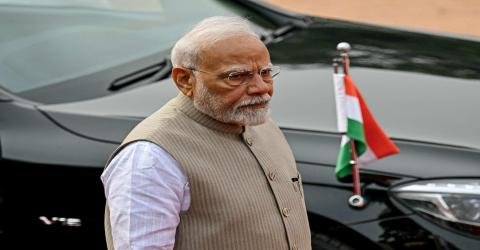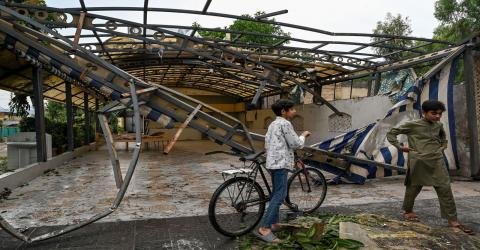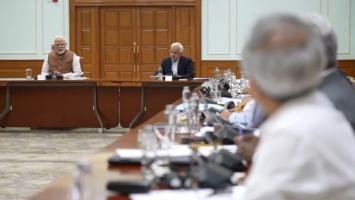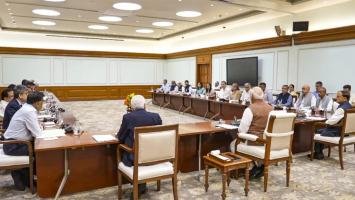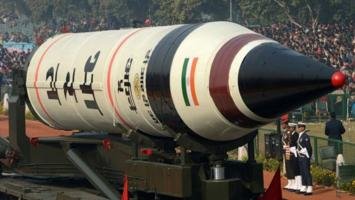‘Escalation is imminent,’ Pakistan’s defence minister says
Suspension of Indus Water Treaty poses serious energy security risk for Pakistan
Federica Marsi
Analysts have said the suspension of the Indus Water Treaty (IWT), which regulates three eastern rivers – Ravi, Sutlej and Beas, poses a serious energy security risk for Pakistan.
Oslo-based think tank Rystad Energy said Pakistan sees 90 percent of its total hydropower capacity disrupted due to altered water flows from India.
“If the treaty were to be terminated altogether, India would gain full control of the Indus, Jhelum and Chenab rivers, enabling it to build more hydropower projects and potentially operate existing upstream facilities in ways that could adversely affect its downstream neighbour,” analyst Uttamarani Pati said in an email sent to Al Jazeera.
“While India is less reliant on hydropower, further escalation could still put its energy infrastructure at risk.”
Twenty-nine drones have been neutralised by the Pakistani army: Military spokesperson
Pakistan’s military spokesman Lieutenant General Ahmed Sharif Chaudhry has released a statement in which he said:
India needs to cut out the “drama” and “war hysteria”.
When Pakistan will strike back, “the whole world will come to know” – we are not dependent on India’s media to report on it.
Twenty-nine drones have been neutralised by the Pakistani army.
Pakistanis have been going about their lives as normal. Though the drone attacks are meant to instil fear in the population, Pakistanis are not scared.
Pakistan’s Punjab province to close all schools for two days: Report
Pakistan’s Punjab government has announced the closure of all public and private schools across the province on tomorrow and Saturday (May 9 and May 10, 2025), according to a memo issued by Secretary School Education Khalid Nazir Wattoo, Pakistani outlet Dawn reported.
“However, examinations scheduled by/on behalf of International Examining bodies (O Level and A Level) shall continue as scheduled,” Dawn cited the memo as stating.
The British Council Pakistan had earlier cancelled many exams – including the GCE, IGCSE, IELTS and University of London exams scheduled for today in Lahore “due to the developing situation”, Dawn reported.
Pakistani drones target Indian-administered Kashmir: Report
There have been attacks in Akhnoor, Samba, Kathua and multiple other locations in Jammu in Indian-administered Kashmir, Reuters reports, citing an unnamed Indian official.
Reuters is also citing Indian military sources as saying that a likely drone attack launched by Pakistan has targeted the area around Jammu Airport in Kashmir.
We will bring you more information as we get it.
India and Pakistan nuclear stockpile a defensive move
Security analyst Syed Mohammed Ali says the nuclear weapons possessed by India and Pakistan “create a scenario for mutually assured destruction”.
“Pakistan and India have enough nuclear weapons to wipe the other side out several times over,” Ali, who is based in Islamabad, the Pakistani capital, told The AP news agency.
Both countries have “deliberately developed” the size and range of their stockpile to remind the other about the guarantee of mutually assured destruction, he adds.
The arsenals are a defensive move to prevent and deter further fighting, because “neither side can afford to initiate such a war or hope to achieve anything from it,” Ali says.
India intercepted drones, attacks in Jammu, according to media reports
There’s currently a complete electricity blackout in Jammu and Kashmir, says journalist Umar Meraj.
“The Indian news outlets are reporting that they have intercepted drones and attacks on several locations in Jammu,” Meraj told Al Jazeera, speaking from Srinagar, in Indian-administered Kashmir.
Sirens are being heard in Jammu and several villages near the Line of Control, Meraj added.
“The clashes between the India and Pakistan forces are far more intense than in previous years. What used to be occasional small firearms have escalated to the heavy exchange of artillery,” the journalist explained.
World powers lack ‘leverage’ or ‘commitment’ to solve crisis
The is no international legal framework or “hegemonic powers in the world which are committed to stepping in and solving this issue” in a way that would be satisfactory to both Pakistan or India, Subir Sinha, a senior lecturer at the Centre of South Asian Studies at the School of Oriental and African Studies in London tells Al Jazeera.
“You look at Britain, while all of this was going on, they were busy signing up the (UK-US) trade deal, and I don’t know if they have leverage … in terms of urging either side to cease”, he said.
“We are living in a world where there isn’t much authority in the United Nations, and in a non-polar world, even … what Trump’s administration will do is really hard to guess, because (it’s) a transactional government, it’s not that they stand for any particular principles”, he noted.
Footage from Jammu resident appears to capture falling projectiles
The following footage captured by a resident of Jammu Trikuta Nagar, in the heart of Jammu city, depicts projectiles soaring through the sky.
“What is this?” the resident can be heard asking in the video.
As we reported earlier, there have been Pakistani attacks in Akhnoor, Samba, Kathua and multiple other locations in Jammu, Reuters said, citing an unnamed Indian official.
Feminist group cancels upcoming annual rally due to ‘war-like situation’
The organisers of one Pakistan’s biggest feminist rallies, Aurat March Karachi, have announced they are postponing this year’s annual march, due to have taken place on May 11, because of the “war-like situation between India and Pakistan”.
“In the current climate, we must consider the risks that disproportionately impact those same communities: the fear of movement, the possibility of violence, and the increased surveillance that always accompanies national security narratives,” the group said in a post on Instagram, adding the decision to postone was not made “easily” or “quickly”.
It added: “War – or even the potential for it – pushes back all struggles for rights, especially the feminist struggle.”
Each year, the rally brings out thousands of people across the country in various cities to demand women’s rights.
Pakistan’s military denies launching drones at Jammu
Abid Hussain, Reporting from Islamabad, Pakistan
The Pakistani military has denied that the country launched any drones towards Jammu in Indian-administered Kashmir.
Two military officials have told Al Jazeera that the accusation by India is yet again “a continuity of their lies,” referring to the claims made by the Indian government earlier in the day, which said Pakistan launched drone attacks on 15 cities.
“Pakistan did not launch any attack last night,” or today, a senior military source said on condition of anonymity, as he was not authorised to speak to the media.
Amnesty International raises alarm over civilian casualties
Carolyn Horn, programme director for law and policy at Amnesty International, says the UK-based group was concerned by reports of loss of civilian lives in both India and Pakistan.
“In every armed conflict, protecting civilians is paramount – it’s a fundamental principle of international humanitarian law which binds all nations,” she said in a statement.
“Deliberate, indiscriminate or disproportionate attacks harming civilians or damaging civilian infrastructure such as homes, hospitals, schools, and essential services, are strictly prohibited under the Geneva Conventions and their additional protocols and under customary international law.”
Pakistan’s Chinese-made jet took down Indian fighter aircraft, US officials say: Report
A top Chinese-made Pakistani fighter shot down at least two Indian military aircraft on Wednesday, two US officials have told the Reuters news agency, marking a major milestone for Beijing’s advanced fighter jet.
One US official, speaking on condition of anonymity, said there was high confidence that Pakistan had used the Chinese-made J-10 aircraft to launch air-to-air missiles against Indian fighter jets, bringing down at least two.
Another official told the agency that at least one Indian jet that was shot down was a French-made Rafale fighter aircraft.
India has not acknowledged the loss of any of its planes and instead said it carried out successful strikes against what it said was “terrorist” infrastructure inside Pakistan.
‘I saw at least two blasts in the air’ Jammu resident says
Residents in Jammu city say they are scared after Pakistani drones attacked the city.
“I was on my way to Jammu from my work place which is around 20km (12.5 miles) away from the city … I reached Jammu around 7:30-8:00pm (14:00-14:30 GMT) and heard some fireworks,” Rashul Singh Oberh told Al Jazeera.
“As soon as I stepped out, I saw at least two blasts in the air and then, there was a sudden blackout,” he said.
“I rushed to my friend’s house nearby and just as I was parking my car, I heard few more explosions and saw a few tracer rounds in the air, which were red,” he added.
‘People are very panicked’
The situation near the Line of Control is grim, with villagers there saying that they are caught in the middle, says journalist Umar Mehraj.
“The authorities have set up many community centeres with ambulances and … fire engines at standby,” Mehraj told Al Jazeera, speaking from Srinagar, in Indian-administered Kashmir.
Both armies have traded heavy artillery along the Line of Control for a second consecutive night, he added.
“(Indian) channels have also reported that the Arnia military base in Jammu (has) been targeted, although there is no official word on the incident,” Mehraj said.
He added: “This new … renewed tension between the countries and the exchange of heavy artillery is very rare … It’s very unusual and the situation at there is very escalating and the people are very panicked.”
‘Escalation is imminent,’ Pakistan’s defence minister says
Khawaja Asif, Pakistan’s defence minister, has told Al Jazeera that tensions will continue to escalate due to India’s actions.
“I have no doubt in my mind now that escalation is imminent because of the continuation of aggression from the Indian side, both on the ground and by sending drones today all over Pakistan,” he said.
“Before that, they attacked us with almost 78 planes … and five planes were downed by our air force. So this has been going on for the last three to four days,” he noted.
“We want to de-escalate the situation … but we are forced (to retaliate) by continuous aggression from the Indian side.
“So there is a very vivid and clear possibility that this confrontation will expand,” he said, adding that confrontations could take place along the Line of Control between Indian and Pakistan, as well as the international border between the two countries.


